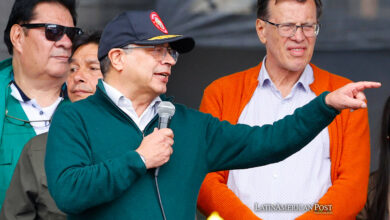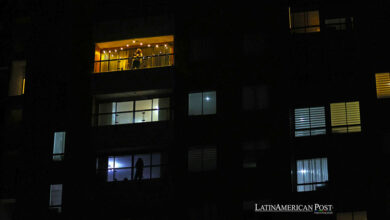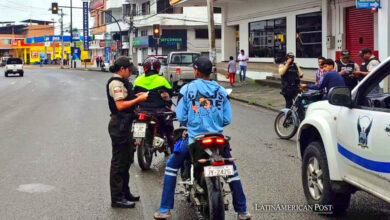Colombia's recent local elections were marred by 98 reported protests and disturbances following the close of voting, reflecting deep-seated concerns over electoral irregularities, unrecognized results, and political polarization. This unrest, occurring in 86 municipalities across 24 departments, marks a significant moment in the nation's ongoing struggle with democratic processes and public trust.

Photo: 10/29/2023. Policemen stand guard at a polling station today in Bogota, Colombia. EFE/ Natalia Pedraza Bravo
The Latin American Post Staff
Escucha este artículo
Leer en español: Una nación al límite: protestas electorales y disturbios en las elecciones locales de Colombia
Democracy Amid Challenges
Colombia's democratic journey, often fraught with challenges, was again tested during the recent local elections. The Electoral Day was overshadowed by unrest, with the Ombudsman's Office reporting 98 protests and disturbances across 86 municipalities in 24 departments. The surge in civil unrest following the closure of the polls is symbolic of a country grappling with political polarization, distrust in electoral processes, and democratic governance.
Of the 98 protests, 77 occurred post-voting, signaling widespread public dissatisfaction and apprehension. Most (42%) of these protests stemmed from disputes over the electoral outcomes, ignited mainly by narrow voting margins between candidates. The razor-thin differences in the vote count not only fueled uncertainty but also raised questions about the integrity of the electoral process, echoing Colombia's history of electoral volatility and the challenges in ensuring fair representation.
Furthermore, allegations of electoral irregularities accounted for 29% of the protests. Accusations of electoral fraud, a long-standing issue in Colombian politics, have often undermined public confidence and sparked civic unrest. These claims echo the country's struggle with corruption and mismanagement in electoral processes, with past elections frequently marred by such controversies.
A Broader Discontent
The remaining protests were attributed to a mix of electoral claims (17%), political polarization (5%), contentious behavior (4%), unrelated issues (2%), and concerns over exclusion from electoral rolls and candidate disqualifications (1% each). These numbers point to a broader discontent and skepticism toward the nation's political and electoral systems. The political polarization aspect, though constituting a smaller percentage, is particularly significant in understanding Colombia's historical context, where ideological divides have frequently escalated into social and political conflicts.
Some of the most notable incidents included the burning and destroying of electoral materials in 13 towns. Such acts of aggression towards the electoral infrastructure not only disrupt the democratic process but also reveal deeper societal fractures and distrust in institutional mechanisms. The pre-election attacks on the Municipal Registry Office of Gamarra (Cesar), leading to the tragic death of an official and injuries to others, underscore the volatile nature of electoral politics in Colombia. This incident, among others following the elections, reflects the extent of societal tensions and the challenges state authorities face in maintaining peace and order.
Before the elections, the Ombudsman's Office had already warned of potential protests, disturbances, and violence in 133 municipalities across 24 departments, highlighting the anticipated risks associated with the electoral process in a nation historically plagued by internal conflict, corruption, and political strife. These warnings, rooted in a deep understanding of Colombia's complex socio-political landscape, were unfortunately realized, adding another chapter to the country's turbulent electoral history.
Elections as a Flashpoint
The elections themselves were a significant undertaking, with 38.9 million Colombians voting to elect 1,102 mayors, 32 governors, and various municipal and departmental representatives. The broad scope of these elections, meant to bolster local governance and representative democracy, instead became a flashpoint for existing grievances and a referendum on the state of the nation's democratic health.
Colombia's struggle with democracy is deeply interwoven with its history of internal conflict, drug trafficking, and socio-economic disparities. These factors, coupled with the public's eroding trust in institutions, set the stage for the kind of electoral unrest witnessed. The recent disturbances are not merely about the outcomes of one election but speak to more significant issues of governance, representation, and public confidence in the democratic process.
Also read: The Political Reform of Gustavo Petro Could Break the Ruling Party
Building a Resilient Democracy
In conclusion, the disturbances and protests surrounding Colombia's recent local elections reflect a broader crisis in democratic governance and public trust. While the immediate triggers were tied to the election's outcomes and alleged irregularities, the underlying causes are rooted in historical, political, and social complexities unique to Colombia. Addressing these challenges requires a concerted effort toward building robust, transparent, and accountable democratic institutions, along with a sincere commitment to addressing the deep-seated grievances and polarizations within Colombian society.





